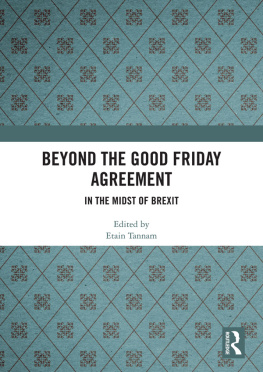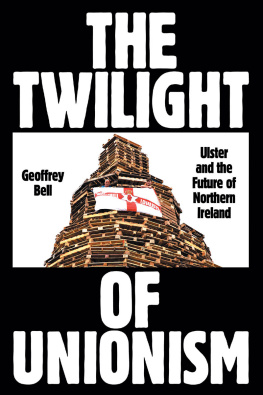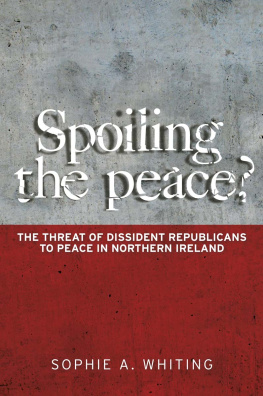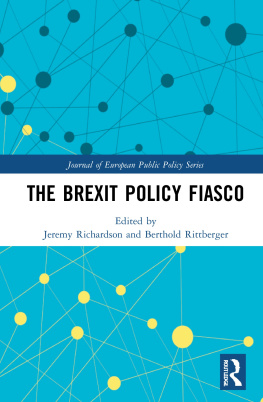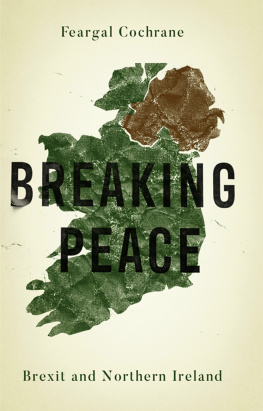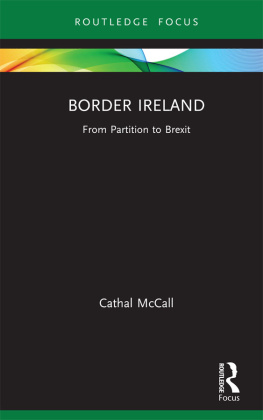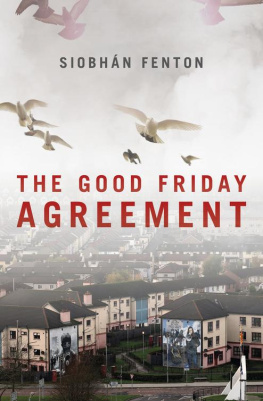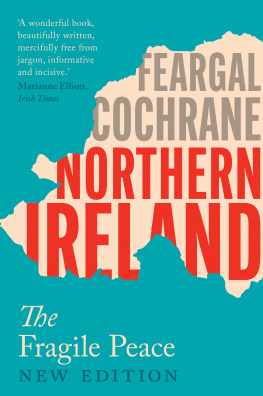Beyond the Good Friday Agreement
2018 marks the 20th anniversary of the Good Friday Agreement. When it was signed few would have imagined Brexit. This book examines the impact of the Good Friday Agreement on internal and cross-border political and economic cooperation between Northern Ireland, Ireland and Britain, in the context of Brexit. It also examines the impact of Brexit to date and concludes with some scenarios about the longer-term impact of Brexit on the Good Friday Agreement itself and on Northern Irelands constitutional status.
The volume comprises chapters from leading academics in the fields of Northern Irish and comparative politics who deal with economic and political aspects of the Good Friday Agreement, making an original contribution to the current debates on conflict resolution. It provides a theoretical framework by renowned expert on consociationalism, Brendan OLeary, as well as a chapter on the BritishIrish relationship in the 21st century by renowned Northern Ireland specialist John Coakley.
This book was originally published as a special issue of Ethnopolitics.
Etain Tannam is Associate Professor of International Peace Studies at Trinity College Dublin, Ireland.
First published 2019
by Routledge
2 Park Square, Milton Park, Abingdon, Oxon, OX14 4RN, UK
and by Routledge
52 Vanderbilt Avenue, New York, NY 10017, USA
Routledge is an imprint of the Taylor & Francis Group, an informa business
2019 The Editor of Ethnopolitics
All rights reserved. No part of this book may be reprinted or reproduced or utilised in any form or by any electronic, mechanical, or other means, now known or hereafter invented, including photocopying and recording, or in any information storage or retrieval system, without permission in writing from the publishers.
Trademark notice: Product or corporate names may be trademarks or registered trademarks, and are used only for identification and explanation without intent to infringe.
British Library Cataloguing-in-Publication Data
A catalogue record for this book is available from the British Library
ISBN13: 978-1-138-38547-4
Typeset in Times New Roman
by codeMantra
Publishers Note
The publisher accepts responsibility for any inconsistencies that may have arisen during the conversion of this book from journal articles to book chapters, namely the possible inclusion of journal terminology.
Disclaimer
Every effort has been made to contact copyright holders for their permission to reprint material in this book. The publishers would be grateful to hear from any copyright holder who is not here acknowledged and will undertake to rectify any errors or omissions in future editions of this book.
Contents
Brendan OLeary
Etain Tannam
John Bradley
Katy Hayward and Mary C. Murphy
Cathal McCall
John Coakley
Brendan OLeary
Guide
The chapters in this book were originally published in the journal Ethnopolitics, volume 17, issue 3 (June 2018). When citing this material, please use the original page numbering for each article, as follows:
Chapter 1
- The Twilight of the United Kingdom & Tiocfaidh r l: Twenty Years after the Good Friday Agreement
- Brendan OLeary
- Ethnopolitics, volume 17, issue 3 (June 2018) pp. 223242
Chapter 2
- Intergovernmental and Cross-Border Civil Service Cooperation: The Good Friday Agreement and Brexit
- Etain Tannam
- Ethnopolitics, volume 17, issue 3 (June 2018) pp. 243262
Chapter 3
- The IrishNorthern Irish Economic Relationship: The Belfast Agreement, UK Devolution and the EU
- John Bradley
- Ethnopolitics, volume 17, issue 3 (June 2018) pp. 263275
Chapter 4
- The EUs Influence on the Peace Process and Agreement in Northern Ireland in Light of Brexit
- Katy Hayward and Mary C. Murphy
- Ethnopolitics, volume 17, issue 3 (June 2018) pp. 276291
Chapter 5
- Brexit, Bordering and Bodies on the Island of Ireland
- Cathal McCall
- Ethnopolitics, volume 17, issue 3 (June 2018) pp. 292305
Chapter 6
- The BritishIrish Relationship in the Twenty-first Century
- John Coakley
- Ethnopolitics, volume 17, issue 3 (June 2018) pp. 306324
Chapter 7
- Postscript: New British Questions or 2019 And All That!
- Brendan OLeary
- Ethnopolitics, volume 17, issue 3 (June 2018) pp. 325333
For any permission-related enquiries please visit: http://www.tandfonline.com/page/help/permissions
John Bradley is Research Professor at the Economic and Social Research Institute, Ireland.
John Coakley is Distinguished International Professor at Queens University Belfast, UK and an Emeritus Professor at University College Dublin, Ireland.
Katy Hayward is Reader in the School of Social Sciences, Education and Social Work at Queens University Belfast, UK.
Cathal McCall is Professor in the School of History, Anthropology, Philosophy and Politics at Queens University Belfast, UK. He is also affiliated with The Senator George J. Mitchell Institute for Global Peace, Security and Justice at Queens University Belfast, UK.
Mary C. Murphy holds a Jean Monnet Chair in European Integration and is Lecturer in Politics in the Department of Government and Politics at University College Cork, Ireland.
Brendan OLeary is Lauder Professor of Political Science at the Perelman Center for Political Science & Economics at the University of Pennsylvania, Philadelphia, USA.
Etain Tannam is Associate Professor of International Peace Studies at Trinity College Dublin, Ireland.
BRENDAN OLEARY
ABSTRACT The Good Friday or Belfast Agreement was reached just over 20 years ago. This article introduces a special issue devoted to appraising its subsequent trajectory. It provides a brief resum of the Agreements contents as a peace agreement, and as a regional consociation with confederal and federal possibilities. The outworkings and partial implementation of the Agreement are reviewed against a theoretical appraisal of the circumstances under which consociations decay, organically dissolve, or definitively break down. Northern Ireland is not in these circumstances, yet. The impact of UKs referendum to leave the European Union (EU) is evaluated as well as the year of the four votes in 20162017, which have jointly left Northern Ireland without a functioning executive or Assembly, and politically divided over the minority UK Conservative governments plans to give effect to the referendum resultNorthern Ireland voted to remain in the EU, and contrary to some suggestions, joint membership of the EU by the UK and Ireland was integral to the making and design of the 1998 Agreement. Future scenarios are sketched.
Anniversaries are occasions for celebrations or commemorations or both. In 2018 the Good Friday Agreement, also known as the Belfast Agreement, is 20 years old. Currently, it is unknown whether it is to be placed in formaldehyde, renewed with or without significant emendation, or about to die. The Agreement is a consociational text and a peace agreement with federal and consociational characteristics. It sought to resolve a conflict that in its most recent manifestation flowed from the control regime exercised by the UUP (Ulster Unionist Party) that had lasted from the British creation of Northern Ireland until 1972. That regime had been politically, nationally, ethnically, culturally, religiously, and economically discriminatory, disorganizing the cultural Catholic population, largely of Irish native descent, and organizing the cultural Protestants who were largely of British settler descent (OLeary, 2019a, 2019b).

